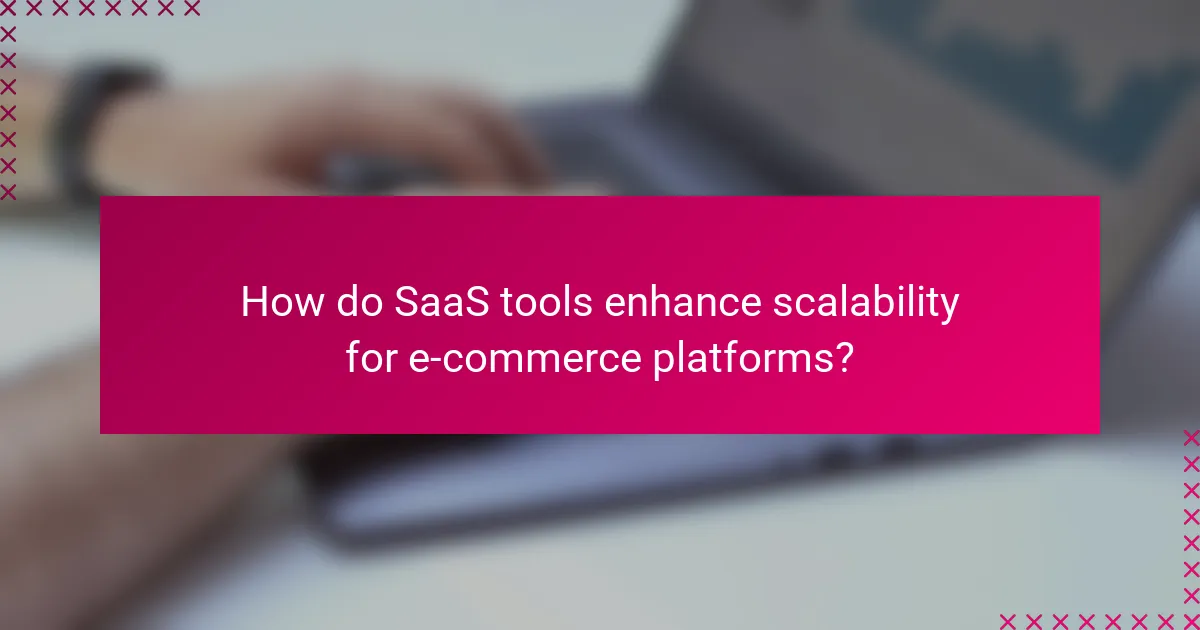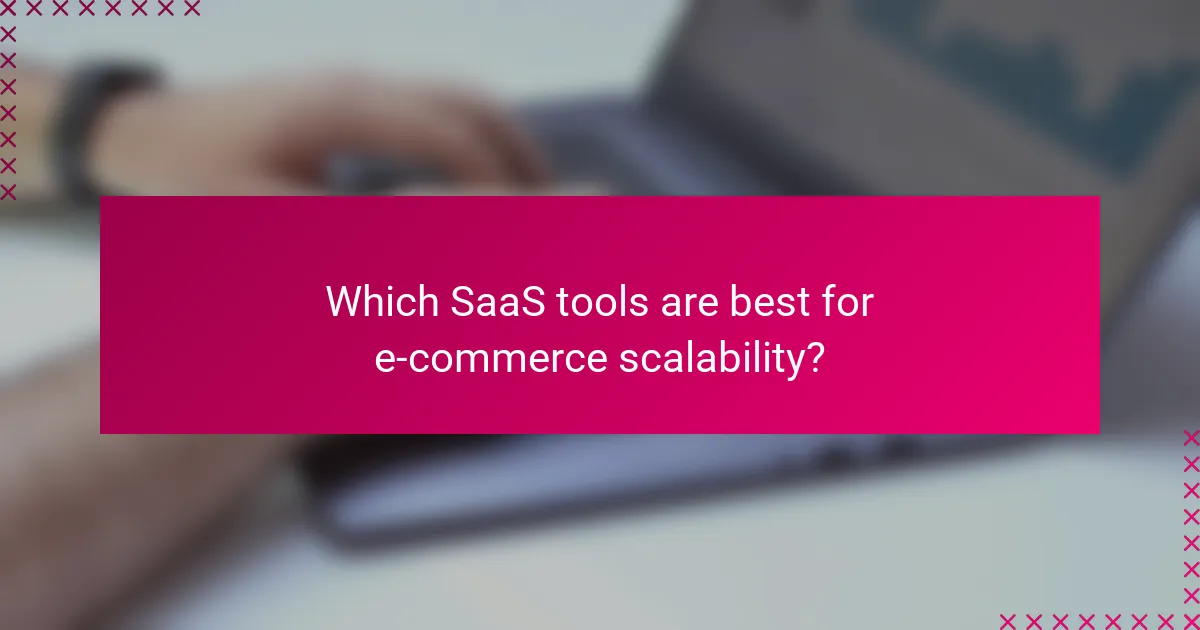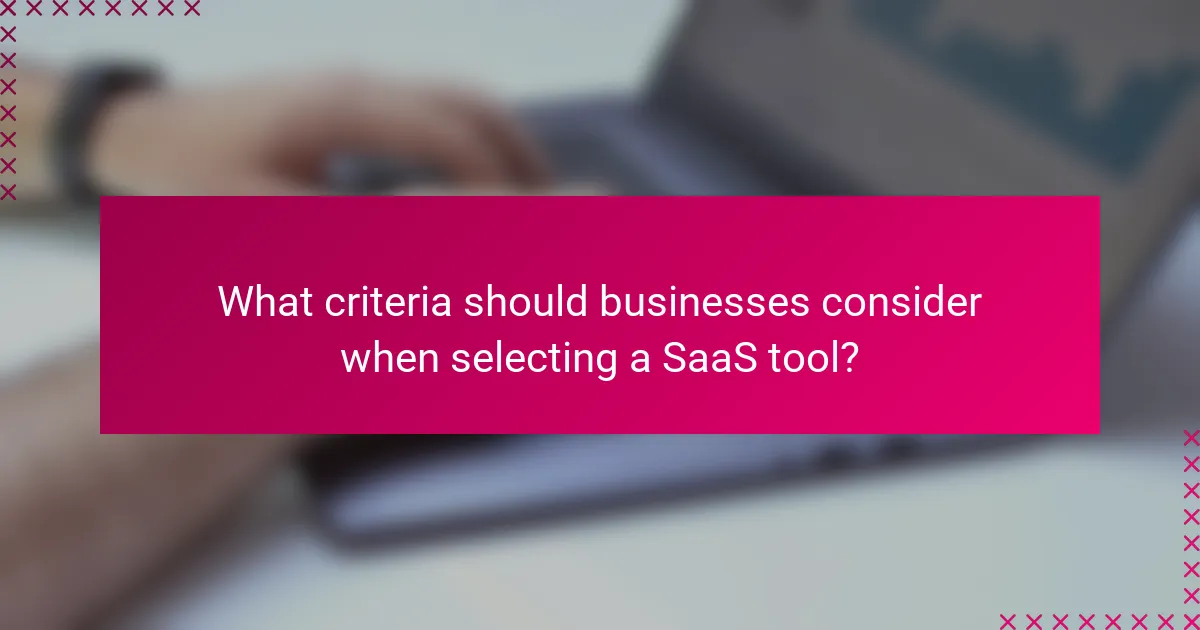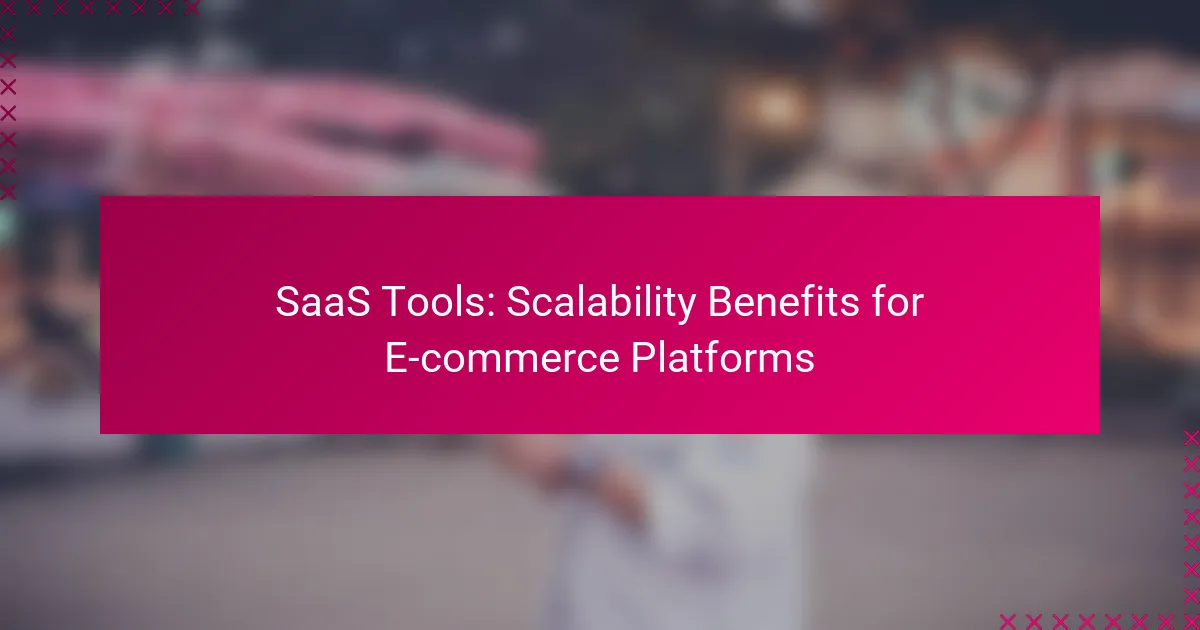SaaS tools play a crucial role in enhancing the scalability of e-commerce platforms by offering flexible resources that can easily adapt to fluctuating traffic and operational demands. This flexibility enables businesses to expand without the limitations of traditional infrastructure, ensuring a smooth and efficient shopping experience for customers. By leveraging SaaS solutions, e-commerce companies can achieve cost efficiency, rapid deployment, and access to advanced features that enhance their overall operational capabilities.

How do SaaS tools enhance scalability for e-commerce platforms?
SaaS tools significantly enhance scalability for e-commerce platforms by providing flexible, on-demand resources that can adjust to varying traffic and operational needs. This adaptability allows businesses to grow without the constraints of traditional infrastructure, ensuring a seamless shopping experience for customers.
Increased server capacity
SaaS solutions offer increased server capacity that can expand as needed, accommodating spikes in traffic during peak shopping seasons or promotional events. This means e-commerce platforms can handle more simultaneous users without compromising performance.
For example, during Black Friday or holiday sales, a SaaS tool can automatically allocate additional server resources, ensuring that the website remains responsive and stable. This flexibility helps prevent downtime, which can lead to lost sales and customer dissatisfaction.
Flexible resource allocation
Flexible resource allocation allows e-commerce businesses to adjust their computing power based on real-time demand. SaaS platforms typically use a pay-as-you-go model, meaning companies only pay for the resources they actually use.
This model is particularly beneficial for startups or smaller businesses that may experience fluctuating traffic. By scaling resources up or down, they can manage costs effectively while still providing a high-quality user experience.
Automated scaling processes
Automated scaling processes in SaaS tools enable e-commerce platforms to adjust resources without manual intervention. This automation can be triggered by specific metrics, such as CPU usage or the number of active users.
For instance, if traffic increases suddenly, the system can automatically provision additional servers to handle the load. This reduces the risk of human error and ensures that the platform remains operational during critical times.
Real-time performance monitoring
Real-time performance monitoring is essential for maintaining optimal scalability in e-commerce platforms. SaaS tools often come with built-in analytics that track key performance indicators, allowing businesses to identify issues before they impact customers.
By continuously monitoring metrics such as page load times and transaction speeds, companies can make informed decisions about when to scale resources. This proactive approach minimizes downtime and enhances user satisfaction.
Integration with cloud services
Integration with cloud services is a key feature of SaaS tools that enhances scalability for e-commerce platforms. These tools can seamlessly connect with various cloud providers, allowing businesses to leverage additional resources as needed.
For example, integrating with services like AWS or Google Cloud can provide access to a vast array of computing resources and storage options. This capability not only supports growth but also enhances data security and redundancy, which are critical for maintaining customer trust.

What are the key benefits of using SaaS for e-commerce scalability?
Using Software as a Service (SaaS) for e-commerce scalability offers several advantages, including cost efficiency, rapid deployment, access to advanced features, and improved customer experience. These benefits help businesses adapt quickly to changing market demands and enhance their operational capabilities.
Cost efficiency
SaaS solutions typically operate on a subscription model, which reduces upfront costs associated with traditional software purchases and infrastructure investments. This model allows e-commerce businesses to pay only for what they use, making it easier to manage budgets and allocate resources effectively.
Additionally, SaaS providers handle maintenance and updates, which can further lower operational costs. Businesses can save on IT staff and resources, allowing them to focus on growth and customer engagement.
Rapid deployment
SaaS platforms can be deployed quickly, often within a matter of hours or days, compared to traditional software that may require extensive installation and configuration. This rapid deployment enables e-commerce businesses to launch new features or services without significant delays.
Moreover, the cloud-based nature of SaaS allows for easy scalability. As demand increases, businesses can quickly adjust their service levels without the need for complex hardware upgrades or installations.
Access to advanced features
SaaS solutions often come with built-in advanced features such as analytics, customer relationship management (CRM), and marketing automation tools. These features can enhance the functionality of e-commerce platforms without the need for additional investments in separate software.
Furthermore, SaaS providers frequently update their offerings, ensuring that businesses have access to the latest technologies and innovations. This continuous improvement helps e-commerce platforms stay competitive in a fast-evolving market.
Improved customer experience
Utilizing SaaS for e-commerce can significantly enhance the customer experience by providing faster load times and more reliable service. With cloud infrastructure, businesses can ensure that their platforms remain accessible even during peak traffic periods.
Additionally, many SaaS solutions offer personalization features that allow businesses to tailor the shopping experience to individual customer preferences. This level of customization can lead to higher customer satisfaction and increased loyalty.

Which SaaS tools are best for e-commerce scalability?
Several SaaS tools excel in providing scalability for e-commerce platforms, allowing businesses to grow efficiently. Key options include Shopify Plus, BigCommerce, Magento Commerce, and Salesforce Commerce Cloud, each offering unique features tailored to different business needs.
Shopify Plus
Shopify Plus is designed for high-volume merchants, offering robust scalability features. It supports unlimited products and transactions, making it suitable for businesses that anticipate rapid growth.
Key benefits include customizable checkout experiences and access to advanced APIs for integration with existing systems. Shopify Plus also provides dedicated support, ensuring that businesses can resolve issues quickly as they scale.
BigCommerce
BigCommerce is known for its flexibility and scalability, allowing businesses to manage large catalogs and high traffic volumes seamlessly. It offers built-in features like SEO tools and multi-channel selling, which are crucial for expanding reach.
With no transaction fees and a variety of payment gateways, BigCommerce helps businesses maximize profits while scaling. Its user-friendly interface enables quick adjustments to product listings and site design as needs evolve.
Magento Commerce
Magento Commerce offers extensive customization options, making it ideal for businesses with specific requirements. It supports complex product catalogs and multiple storefronts, providing a scalable solution for diverse markets.
While Magento requires more technical expertise to manage, its powerful features, such as advanced analytics and personalized customer experiences, can significantly enhance scalability. Businesses should consider their technical resources before choosing this platform.
Salesforce Commerce Cloud
Salesforce Commerce Cloud integrates seamlessly with other Salesforce products, providing a comprehensive solution for businesses looking to scale. Its AI-driven insights help optimize customer experiences and streamline operations.
This platform supports B2B and B2C models, making it versatile for various business types. However, its pricing can be on the higher side, so businesses should evaluate their budget against the potential benefits of enhanced scalability.

What criteria should businesses consider when selecting a SaaS tool?
Businesses should focus on integration capabilities, scalability features, and overall cost when selecting a SaaS tool. These criteria ensure that the chosen solution aligns with existing systems and can grow alongside the business’s needs.
Integration capabilities
Integration capabilities refer to how well a SaaS tool can connect with other software and systems. Effective integration allows for seamless data transfer and process automation, which can enhance operational efficiency. Look for tools that offer APIs, pre-built connectors, or support for popular platforms like Shopify or WooCommerce.
When evaluating integration, consider the complexity of your current tech stack. A tool that integrates easily with your existing systems can save time and reduce the need for extensive training. Additionally, check for compatibility with third-party applications that your business relies on.
Scalability features
Scalability features determine how well a SaaS tool can adapt to increasing demands as your e-commerce platform grows. A scalable solution can handle higher traffic volumes, more transactions, and additional users without compromising performance. Look for features like adjustable pricing tiers, flexible resource allocation, and performance monitoring tools.
Consider your business’s growth projections when assessing scalability. A good SaaS tool should allow you to upgrade or downgrade your plan easily based on your needs. Avoid tools that lock you into long-term contracts without the option to scale, as this can hinder your ability to adapt to market changes.
